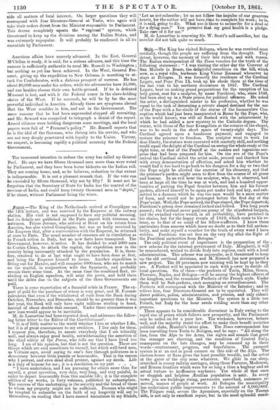Frann.—The King of the Netherlands arrived at Compiegne on the
12th instant, and was received by the Emperor at the railway station. His visit is not supposed to have any politcial meaning, but its details are published in the Paris papers with tiresome mi- nuteness. Prince Jerome, who arrived at Brest on his return from America, has also visited Compiegne, but was so badly received by the Empress that, after a conversation with the Emperor, he returned at once to Paris. The usual number of rumours are in circulation as to French action in Italy, but no new facts have transpired. The Government, however, is active. It has decided to send 5000 men to Cochin China, to attack the capital, the expedition now in the country being incessantly attacked by the population. It is, there- fore, resolved to do at last what ought to have been done at first, and bring the Emperor himself to terms. Another expedition is fitting out for Mexico, and will comprise 8000 men, who are to march on the capital, in conjunction with the Spaniards, and probably remain there some time. At the same time the combined fleet, in- cluding an English squadron, will seize the ports, and hold them until the debts due to the subjects of the three Governments are
d.
Thereis some expectation of a financial crisis in France. The ex- port of gold for the purchase of wheat is very great, and M. Forcade calculates that even if the withdrawal of cash from the Bank during October, November, and December, should be no greater than it was last year, the Bank will only have eight millions sterling in hand, instead of about double that amount. Under these circumstances a new loan would appear to be inevitable.
M. de Lamartine had been reported dead, and addresses the follow- ing bitter letter to the Editor of the Constitutionnel : "It is of little matter to the world whether I live or whether I die, but it is of great consequence to my creditors. I live only for them. I requestyou, therefore, to assure everybody that I am tolerably well, and always enjoy good health, notwithstanding the assertion of the chief editor of the Presse, who tells me that I have lived too long. I am of his opinion, but that is not the question. These are things which are said sometimes to oneself, but which well-bred men, as Voltaire says, avoid saying to one's face through politeness in a democracy however little puerile or honourable. That is the reason why I protest, and even dead shall protest, against my death. Life is a duty of honour for me ; it is a resolution on my part . . .
" I lave undertaken, and I am pursuing for others more than for myself, a great operation, very dear, very long, and very painful, in order to depart honourably from this amiable life; it is the complete edition of my works, in forty volumes, published by subseaiption. The success of this undertaking is the security and the bread of those to whom my property might not be sufficient. Persons who might be tempted to subscribe on the faith of my longevity will say to themselves, on reading that I have caused uneasiness to my friends, `Let us not subscribe; let us not follow the impulse of our generous hearts, for the author will not have.time to complete his work; he is, it is said, going to die. What use is there to subscribe for a dead or for a dying man ?' You perceive that my good health is a pledge. Take care of it for me."
M. de Lamartine is renewing Sir. W. Scott's self-sacrifice, but the novelist did not talk quite so much.






























 Previous page
Previous page